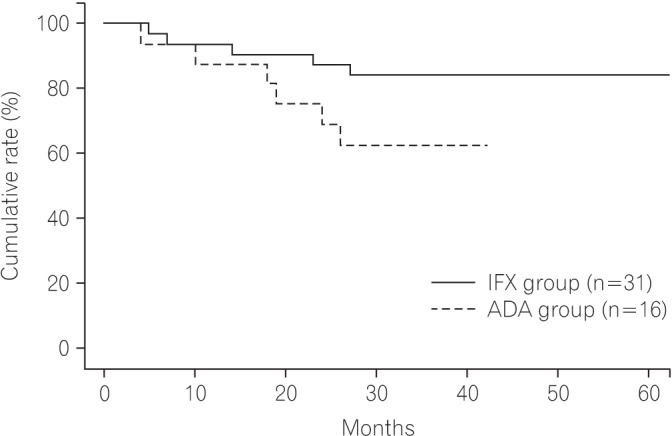Clinical efficacy of adalimumab versus infliximab and the factors associated with recurrence or aggravation during treatment of anal fistulas in Crohn's disease
- Affiliations
-
- 1Coloproctology Center, Takano Hospital, Kumamoto, Japan. micg@takano-hospital.jp
- KMID: 2425159
- DOI: http://doi.org/10.5217/ir.2017.15.2.182
Abstract
- BACKGROUND/AIMS
Infliximab has proven to be effective in the treatment of perianal fistulas in Crohn's disease (CD) but the efficacy of adalimumab is still unclear. The aim of this study is to assess the clinical efficacy of adalimumab and compare the results with those for infliximab.
METHODS
Forty-seven CD patients treated for perianal fistulas with infliximab from September 2005 to December 2010 (n=31), or with adalimumab from November 2010 to May 2012 (n=16), were enrolled in this retrospective study. The following patient characteristics were analyzed; intestinal lesion site, fistula classification, seton placement, index of inflammatory bowel disease, C-reactive protein level, follow-up period, and the cumulative rate of nonrecurrence or aggravation of fistula.
RESULTS
There were no significant differences in the intestinal lesion site, fistula classification, inflammatory bowel disease index, C-reactive protein level, and the frequency of injection between the infliximab group and the adalimumab group. The cumulative rate of nonrecurrence or aggravation of fistula was 62.5% in the adalimumab group and 83.9% in the infliximab group at 24 months after treatment (P=0.09). The risk factors for recurrence or aggravation may be related to seton placement (P=0.02), gender (P=0.06), and fistula classification (P=0.07).
CONCLUSIONS
There was no significant difference in the clinical efficacy of adalimumab and infliximab in the treatment of perianal fistulas in CD. However, fistula classification may be an important risk factor for recurrence or aggravation. The preliminary findings in this study show that further research is warranted.
Keyword
MeSH Terms
Figure
Cited by 3 articles
-
Clinical Features and Outcomes of Tuberculosis in Inflammatory Bowel Disease Patients Treated with Anti-tumor Necrosis Factor Therapy
Jihye Kim, Jong Pil Im, Jae-Joon Yim, Chang Kyun Lee, Dong Il Park, Chang Soo Eun, Sung-Ae Jung, Jeong Eun Shin, Kang-Moon Lee, Jae Hee Cheon
Korean J Gastroenterol. 2020;75(1):29-38. doi: 10.4166/kjg.2020.75.1.29.Best practices on immunomodulators and biologic agents for ulcerative colitis and Crohn’s disease in Asia
Choon Jin Ooi, Ida Hilmi, Rupa Banerjee, Sai Wei Chuah, Siew Chien Ng, Shu Chen Wei, Govind K Makharia, Pises Pisespongsa, Min Hu Chen, Zhi Hua Ran, Byong Duk Ye, Dong Il Park, Khoon Lin Ling, David Ong, Vineet Ahuja, Khean Lee Goh, Jose Sollano, Wee Chian Lim, Wai Keung Leung, Raja Affendi Raja Ali, Deng Chyang Wu, Evan Ong, Nazri Mustaffa, Julajak Limsrivilai, Tadakazu Hisamatsu, Suk Kyun Yang, Qin Ouyang, Richard Geary, Janaka H De Silva, Rungsun Rerknimitr, Marcellus Simadibrata, Murdani Abdullah, Rupert WL Leong
Intest Res. 2019;17(3):285-310. doi: 10.5217/ir.2019.00026.Adalimumab or infliximab: which is better for perianal fistula in Crohn's disease?
Jong Pil Im
Intest Res. 2017;15(2):147-148. doi: 10.5217/ir.2017.15.2.147.
Reference
-
1. Kappelman MD, Rifas-Shiman SL, Kleinman K, et al. The prevalence and geographic distribution of Crohn's disease and ulcerative colitis in the United States. Clin Gastroenterol Hepatol. 2007; 5:1424–1429. PMID: 17904915.
Article2. Ng SC, Tang W, Ching JY, et al. Incidence and phenotype of inflammatory bowel disease based on results from the Asia-Pacific Crohn's and colitis epidemiology study. Gastroenterology. 2013; 145:158–165.e2. PMID: 23583432.
Article3. Zeng Z, Zhu Z, Yang Y, et al. Incidence and clinical characteristics of inflammatory bowel disease in a developed region of Guangdong Province, China: a prospective population-based study. J Gastroenterol Hepatol. 2013; 28:1148–1153. PMID: 23432198.
Article4. Yao T, Matsui T, Hiwatashi N. Crohn's disease in Japan: diagnostic criteria and epidemiology. Dis Colon Rectum. 2000; 43(10 Suppl):S85–S93. PMID: 11052483.5. Penner A, Crohn BB. Perianal fistulae as a complication of regional ileitis. Ann Surg. 1938; 108:867–873. PMID: 17857277.
Article6. Marzo M, Felice C, Pugliese D, et al. Management of perianal fistulas in Crohn's disease: an up-to-date review. World J Gastroenterol. 2015; 21:1394–1403. PMID: 25663759.
Article7. Hukkinen M, Pakarinen MP, Piekkala M, Koivusalo A, Rintala R, Kolho KL. Treatment of complex perianal fistulas with seton and infliximab in adolescents with Crohn's disease. J Crohns Colitis. 2014; 8:756–762. PMID: 24447625.
Article8. Castaño-Milla C, Chaparro M, Saro C, et al. Effectiveness of adalimumab in perianal fistulas in Crohn's disease patients naive to anti-TNF therapy. J Clin Gastroenterol. 2015; 49:34–40. PMID: 25485513.
Article9. Kawalec P, Mikrut A, Wiśniewska N, Pilc A. Tumor necrosis factor-alpha antibodies (infliximab, adalimumab and certolizumab) in Crohn's disease: systematic review and meta-analysis. Arch Med Sci. 2013; 9:765–779. PMID: 24273556.10. Su CG, Lichtenstein GR. Influence of immunogenicity on the long-term efficacy of infliximab in Crohn's disease. Gastroenterology. 2003; 125:1544–1546. PMID: 14598275.
Article11. Ueno F, Matsui T, Matsumoto T, et al. Evidence-based clinical practice guidelines for Crohn's disease, integrated with formal consensus of experts in Japan. J Gastroenterol. 2013; 48:31–72. PMID: 23090001.
Article12. Antakia R, Shorthouse AJ, Robinson K, Lobo AJ. Combined modality treatment for complex fistulating perianal Crohn's disease. Colorectal Dis. 2013; 15:210–216. PMID: 22672653.
Article13. Echarri A, Castro J, Barreiro M, Carpio D, Pereira S, Lorenzo A. Evaluation of adalimumab therapy in multidisciplinary strategy for perianal Crohn's disease patients with infliximab failure. J Crohns Colitis. 2010; 4:654–660. PMID: 21122576.
Article
- Full Text Links
- Actions
-
Cited
- CITED
-
- Close
- Share
- Similar articles
-
- Adalimumab Treatment in Pediatric-Onset Crohn's Disease Patients after Infliximab Failure: A Single Center Study
- Adalimumab or infliximab: which is better for perianal fistula in Crohn's disease?
- Biological Therapy for the Prevention and Treatment of Postoperative Endoscopic Recurrence in Crohn's Disease: Time for Acceptance?
- Pulmonary Extraintestinal Manifestation of Crohn's Disease Treated Successfully with Adalimumab
- Recent Trends of Infliximab Treatment for Crohn's Disease


